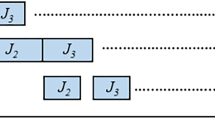Abstract
We study the following energy-efficient scheduling problem. We are given a set of n jobs which have to be scheduled by a single processor whose speed can be varied dynamically. Each job \(J_j\) is characterized by a processing requirement (work) \(p_j\), a release date \(r_j\), and a deadline \(d_j\). We are also given a budget of energy E which must not be exceeded and our objective is to maximize the throughput (i.e., the number of jobs which are completed on time). We show that the problem can be solved optimally via dynamic programming in \(O(n^4 \log n \log P)\) time when all jobs have the same release date, where P is the sum of the processing requirements of the jobs. For the more general case with agreeable deadlines where the jobs can be ordered so that, for every \(i < j\), it holds that \(r_i \le r_j\) and \(d_i \le d_j\), we propose an optimal dynamic programming algorithm which runs in \(O(n^6 \log n \log P)\) time. In addition, we consider the weighted case where every job \(J_j\) is also associated with a weight \(w_j\) and we are interested in maximizing the weighted throughput (i.e., the total weight of the jobs which are completed on time). For this case, we show that the problem becomes \(\mathcal{NP}\)-hard in the ordinary sense even when all jobs have the same release date and we propose a pseudo-polynomial time algorithm for agreeable instances.


Similar content being viewed by others
Notes
There is always an optimal non-preemptive schedule for this problem even if preemptions are allowed (see Property 1).
References
Angel, E., Bampis, E., & Chau, V. (2014). Throughput maximization in the speed-scaling setting. In E. W. Mayr & N. Portier (Eds.), STACS, LIPIcs (Vol. 25, pp. 53–62). Wadern: Schloss Dagstuhl-Leibniz-Zentrum fuer Informatik.
Bansal, N., Chan, H. L., Lam, T. W., & Lee, L. K. (2008). Scheduling for speed bounded processors. In L. Aceto, I. Damgård, L. A. Goldberg, M. M. Halldórsson, A. Ingólfsdóttir, & I. Walukiewicz (Eds.), ICALP. Lecture notes in computer science (Vol. 5125, pp. 409–420). Berlin: Springer.
Baptiste, P. (1999). An O(\({n}^4\)) algorithm for preemptive scheduling of a single machine to minimize the number of late jobs. Operations Research Letters, 24(4), 175–180.
Chan, H. L., Chan, W. T., Lam, T. W., Lee, L. K., Mak, K. S., & Wong, P. W. H. (2007). Energy efficient online deadline scheduling. In N. Bansal, K. Pruhs, & C. Stein (Eds.), SODA (pp. 795–804). New Orleans: SIAM.
Chan, H. L., Lam, T. W., & Li, R. (2010). Tradeoff between energy and throughput for online deadline scheduling. In K. Jansen & R. Solis-Oba (Eds.), WAOA. Lecture notes in computer science (Vol. 6534, pp. 59–70). Berlin: Springer.
Chan, J. W. T., Lam, T. W., Mak, K. S., & Wong, P. W. H. (2007). Online deadline scheduling with bounded energy efficiency. In J. Cai, S. B. Cooper, & H. Zhu (Eds.), TAMC. Lecture notes in computer science (Vol. 4484, pp. 416–427). Berlin: Springer.
Graham, R. L., Lawler, E. L., Lenstra, J. K., & Kan, A. (1979). Optimization and approximation in deterministic sequencing and scheduling: A survey. Annals of Discrete Mathematics, 5, 287–326.
Lam, T. W., Lee, L. K., To, I. K. K., & Wong, P. W. H. (2007). Energy efficient deadline scheduling in two processor systems. In T. Tokuyama (Ed.), ISAAC. Lecture notes in computer science (pp. 476–487). Berlin: Springer.
Lawler, E. L. (1990). A dynamic programming algorithm for preemptive scheduling of a single machine to minimize the number of late jobs. Annals of Operations Research, 26(1), 125–133.
Lawler, E. L. (1994). Knapsack-like scheduling problems, the Moore-Hodgson algorithm and the tower of sets property. Mathematical and Computer Modelling, 20(2), 91–106.
Li, M. (2011). Approximation algorithms for variable voltage processors: Min energy, max throughput and online heuristics. Theoretical Computer Science, 412(32), 4074–4080.
Moore, J. M. (1968). An n job, one machine sequencing algorithm for minimizing the number of late jobs. Management Science, 15(1), 102–109.
Pruhs, K., Uthaisombut, P., & Woeginger, G. J. (2008). Getting the best response for your erg. ACM Transactions on Algorithms, 4(3), 38.
Yao, F. F., Demers, A. J., & Shenker, S. (1995). A scheduling model for reduced CPU energy. FOCS (pp. 374–382). Philadelphia: IEEE Computer Society.
Acknowledgments
This work has been supported by the ANR project TODO (09-EMER-010), by PHC CAI YUANPEI (27927VE) and by the ALGONOW project of the THALES program.
Author information
Authors and Affiliations
Corresponding author
Additional information
A preliminary version of this work appeared in the proceedings of the 10th International Conference on Theory and Applications of Models of Computation (TAMC), pp. 10–19, 2013.
Rights and permissions
About this article
Cite this article
Angel, E., Bampis, E., Chau, V. et al. Throughput maximization for speed scaling with agreeable deadlines. J Sched 19, 619–625 (2016). https://doi.org/10.1007/s10951-015-0452-y
Published:
Issue Date:
DOI: https://doi.org/10.1007/s10951-015-0452-y




